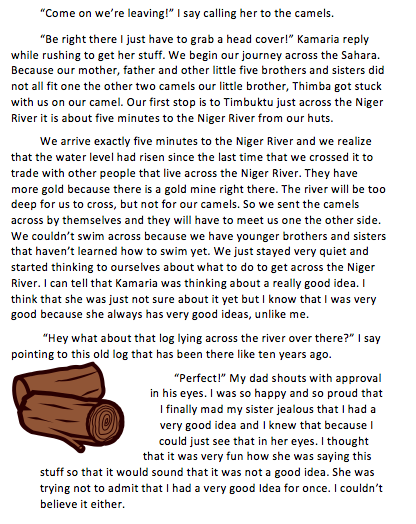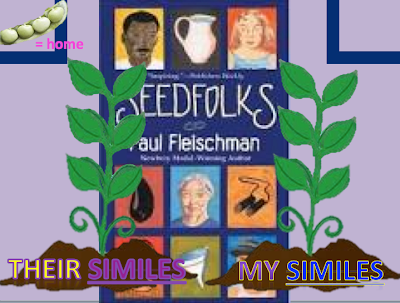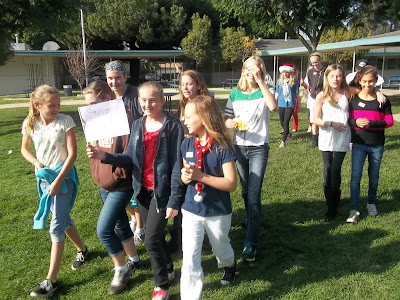STUDENT EXAMPLE #1:
STUDENT EXAMPLE #2:
STUDENT EXAMPLE #3:
Stopping
By Woods on a Snowy Evening
By: Robert Frost
7 Between the woods and frozen lake[A10]
9 He gives his harness bells a shake[A12]
11 The only other sound's the sweep[A14]
In the
poem “Stopping by the Woods on a Snowy Evening” by Robert Frost, a traveler is
stopping in the empty woods that are owned by a man who must be powerful. The man who owns the woods also seems
to have left the woods alone for a while, and has other important business in
the village. The poet has also
left you questioning, because he is not telling the reader what his business
here is, so the reader’s mood is confused and interested. We can also assume that this traveler’s
business is secret, and he is being secretive, because he seems to not want to
be seen by the man who owns the woods.
The writer also sounds like Jack Frost, because he mentions that he is
going to “watch his woods fill up with snow”, which
sound like the writer is the one who is going to fill the woods up with
snow. The horse being confused
that the traveler is stopping tells me that this horse is smart, and knows that
they have other business to do.
And maybe he has to stop because it is the “darkest evening of the year”. And possibly the reason that it is very
quiet and empty is because it is so dark.
And the way that he describes the woods as beautiful and “lovely” tells
me that he enjoys being here. But
because he describes the woods as “deep” he is looking for some lost
object. Or many people get lost here
because the foliage is so thick. And
because he has “promises to keep”, this says that he cannot stay, and that
someone is telling him to do this, someone who is also powerful. Or possibly he has “promises to keep”
because he has some desire to find something. And he must have already traveled many miles, although he
has many to go. His repetition in
the last two lines says that he must want to sleep, but can’t. Maybe he is so sleepy that he is not
thinking clearly and is repeating things.
Overall I think that this poem is supposed to leave you confused, and
interested in what the meaning is.
That must be why this poem is so popular, it leaves readers confused and
searching for more, just like it has for me.
[A1]Who
“owns” these woods must be powerful.
Maybe even a spirit or higher being. I can infer that the writer has not been in these woods for
a very long time. I can also
assume the speaker must have a confused tone, and that he is commemorating an
event that happened here. (1)
[A2]“He”
must not come or notice these woods often. Where he lives he must be busy, and sort of ignore these
woods. Maybe this is why the poet
is here. And he must be far away.
(2)
[A3]The
writer must not want to be seen, and is very secretive. He might not be supposed to be here
either. And his business is secret,
because he in no telling the reader what he is doing. So the readers mood must be: interested and confused. (3)
[A4]This
related to the previous line, because he must not notice this place much. (3)
[A5]This
makes me think that the writer is jack frost, because this sentence sounds like
the writer is filling the woods with snow. (4)
[A6]He
must be a traveler, I can infer that he has come a long way, and is bothered
that “He” has not been in these woods. (5)
[A7]This
means strange or unusual. So the
horse must think it is strange that they are stopping in the middle of a cold
forest. (5)
[A8]Maybe
he has no choice but to stop, because it is dark. (6)
[A9]This
assists my thought of it being jack frost, because not everybody can just stop
and rest in the middle of the woods at dark. (6)
[A10]This
kind of seems that it symbolizes that these woods have kind of frozen in time.
(7)
[A11]Possibly
this is why these woods are so silent, and empty. (8)
[A12]This
horse must be smart, if he knows that this is not a smart choice. (9)
[A13]The
horse must not like this idea of stopping . (10)
[A14]These
woods must be silent, this peace might seem mysterious to the reader. (11)
[A15]This
peace must symbolize something, possibly peace, abandoned, and loneliness. (12)
[A16]It
must be snowing right now, and I think this might symbolize beauty. (12)
[A17]Possibly
the writer came here for this beauty and peace, and that is why he is staying
here. (12)
[A18]This
also shows that this place is beautiful. (13)
[A19]Perhaps
people get lost here, and he is on a search for someone or something. and he wants to stay. (13)
[A20]I
think that he wants to stay, but can't because he is on a search for
something. Maybie that is why the
horse is confused, it knows that they have other bussiness to do. and someone is making him take this
journey, someone who is powerful like the person who owns these woods. (14)
[A21]This
shows that he must be on a search for someone or something, and that he has already
come many miles. (15)
[A22]
I can infer that he wants to sleep, but cant.
STUDENT EXAMPLE #4:
Shall
I compare thee to a summer's day? (Sonnet 18)
By: William Shakespeare
In
the poem “Shall I compare thee to a summer's day?” by William Shakespeare, the
poet’s tone is filled with admiration and passion for a girl. He loves her and
compares her to things and settings that are known for their beauty, liveliness,
and dreaminess. For example, “Shall I compare thee to a summer's day ?” (1). He is comparing a beautiful
sunny day, and lively people laughing and playing under the sun, to the love of
his life. He also mentions that her beauty shines through dark times, like a
star in heaven. When reading this following line, keep in mind how the poet is
referring to the love of his life, and how heaven is known to be a dreamy
place, where dreams come true before your eyes. ”… the eye of heaven shines” (5). No
matter how much the poet loves her, he doesn’t always think so highly of her.
For example, “And every fair from fair sometime declines” (7). He compares her
also to a shining star who dims, and sometimes her beauty doesn’t shine as
bright, but automatically comes back to life, mentioning how her beauty will
never leave her side, and will always linger around her. “But thy eternal
summer shall not fade”(9). Though
no matter what, the poet still loves her dearly, and thinks highly of her, and
wants her spirit to live for eternity, as it does. “So long lives this, and
this gives life to thee”(14). Overall, this poet thinks very highly of the fair
love of his life.
[A1]I
can infer that the poet is referring to a woman that he loves, and thinks she
is beautiful. I assume this, because a summer’s day is usually lovely, filled
with beauty, as the sun is set high above the horizon. People laugh, and play
outside, making the world a happy, and lively place. So, he is comparing a
beautiful women which he loves, who is as beautiful as a summers day. I noticed
that the first line is the title repeated.
[A2]I
just looked up the definition of temperate, and I discovered that it can mean
mild, and pleasant. So, basically, he is saying that she is even more lovely
then a sunny day, and more pleasant to be around. The poet is talking about
this women with much devotion, comparing her to a summers day, and even
exclaiming how she is actually better.
[A3]Does
this poem take place in may? Maybe he is saying that they do sometimes go
through rough times (“rough winds shake the darling buds”). I suppose that he
is referring darling buds to the woman he so dearly admires.
[A4]I
am not exactly sure what William Shakespeare means in this line, but I can
infer that he might be saying that however much time he spent with thee, It
seems to zoom by, and he will never spend enough time with thee.
[A5]Don’t
take this literally, because heaven doesn’t have eyes (if there is a heaven),
and eyes aren’t hot. I am not sure
in what context the poet means in “hot” (5). If I were to translate this line,
I would write: I see you as a dazzling star from heaven. Usually heaven is
thought as a dreamy place, where everything is possible, and wishes come true.
[A6]Here,
when the poet says gold complexion, he is talking about the “eye of heaven”
(6), which might be a bright star. So basically, he is saying however bright
this star (his love) can be, sometimes she dims. However beautiful she is,
sometimes her beauty, can fade into the night.
[A7]In
the book Romeo and Juliet, which I have been reading, I have often read
the word fair. That was the first time I’ve seen that word, but after I looked
up this word in the dictionary, I learned that fair can mean beauty. Another
way I could write this line would be: And every beauty from beauty sometimes
declines. If you know synonyms for words, you can break up the phrase, making
it more understandable.
[A8]Nature
makes me think of mother nature, so he might be referring to his loved one. I
don’t think that in this context it means what I first think, but I will still
tell you what I first think. I first think of a girl (“nature”) going through
puberty (“changing course”). I don’t think that what I first think would fit in
this sentence, because I first thought that Shakespeare was talking about a
grown women. Maybe he is talking about mood swings???
[A9]My
translation for this line is: even though her beauty may dim once in a while,
no matter what, He will still find the beauty in her. It will always linger
around her. As I said before, breaking up the sentence, and knowing all of the
vocabulary, this complex sentence can transform into come a legible and
understandable sentence.
[A10]He
must truly love her, as he thinks of her as his: “thou ow’st (10). I might be
mistaken, but I thought that ow’st meant my own. Overall, sometimes her beauty
may decline, I can never imagine not having her by my side.
[A11]At
first, I had trouble understanding this line, but with Ms. Lukins help, I
understood that of course she will die at one point or another, and death will
brag, when she will stand in his grasp. He must think that what he sees in her,
death sees the same beauty that lies in the poet's eyes.
[A12]The
poet thinks that she may die, and be in death’s possession, in his heart, as
time passes, she will just grow, and become brighter than ever.
[A13]This
line defines life. If you can breathe, and see, you are truly alive.
[A14]In
this line, when he says “this”, I suspect that he is referring to the poem
itself. He is saying even after your existence, you will still live in this
poem, as long as it shall live itself.



















































